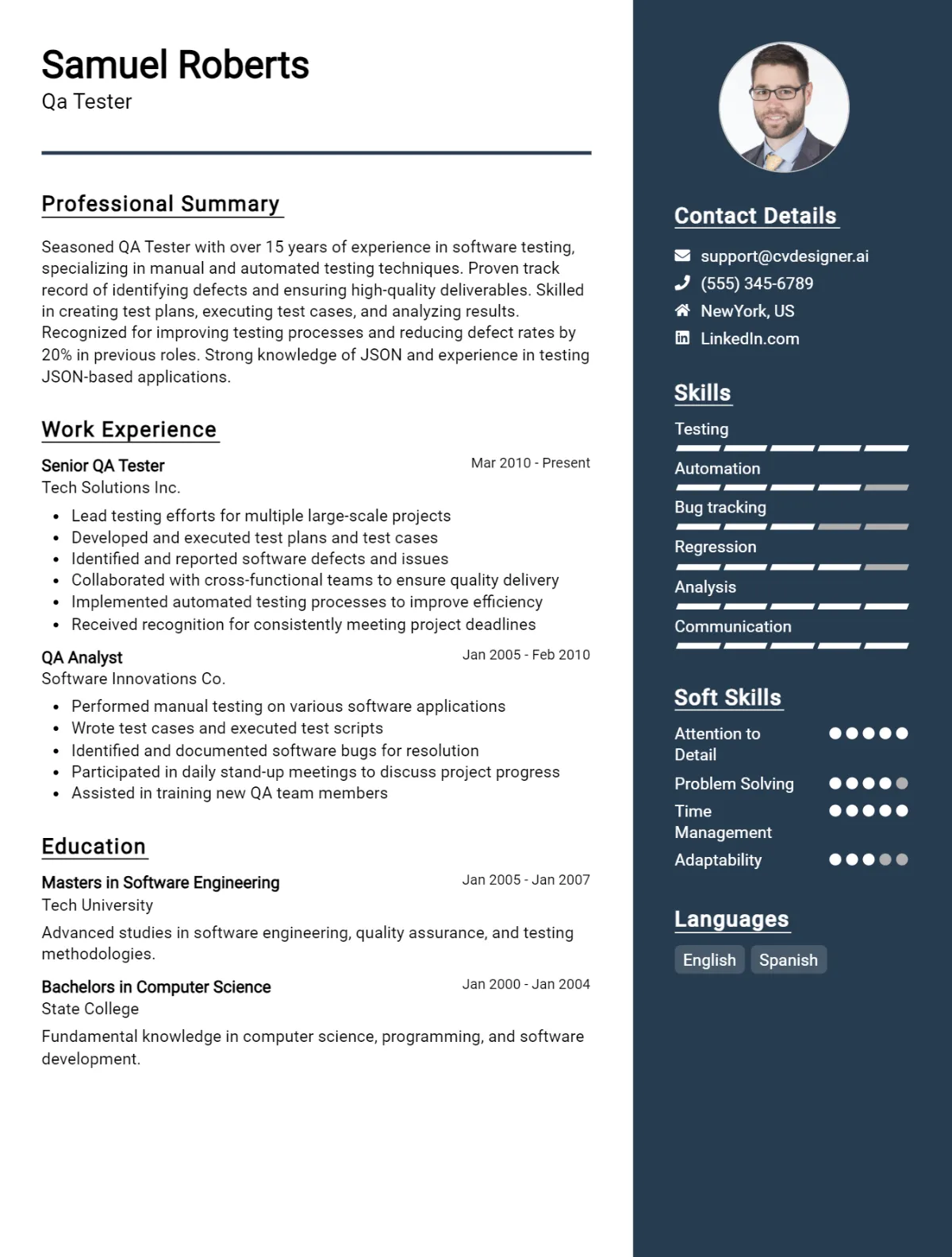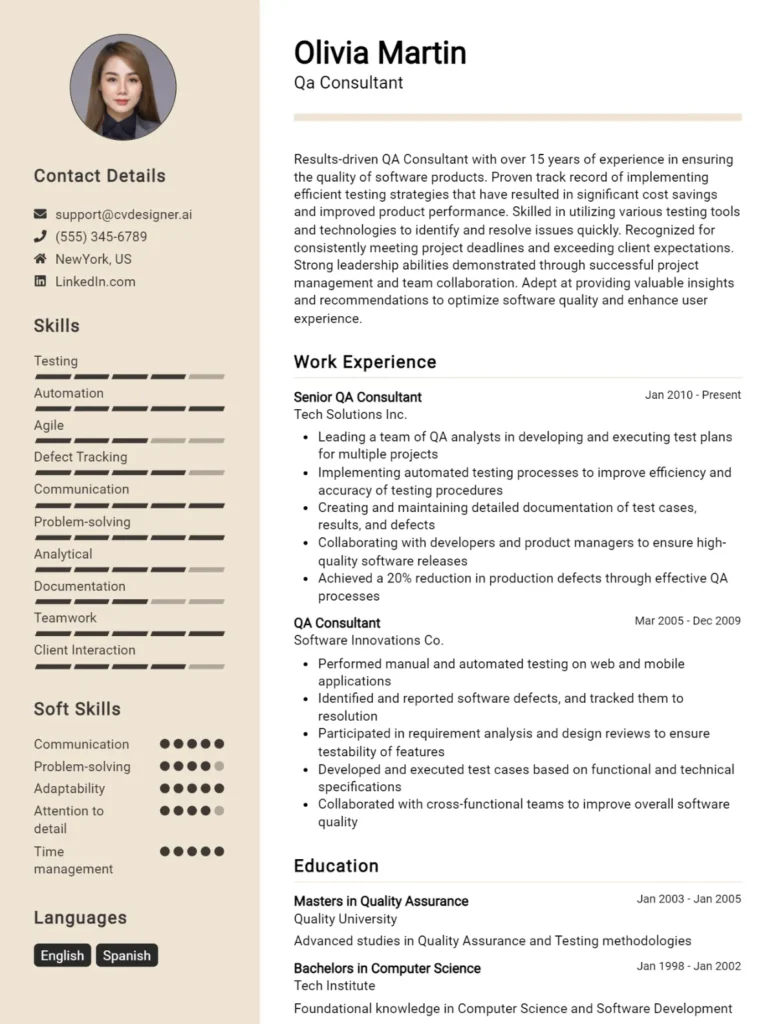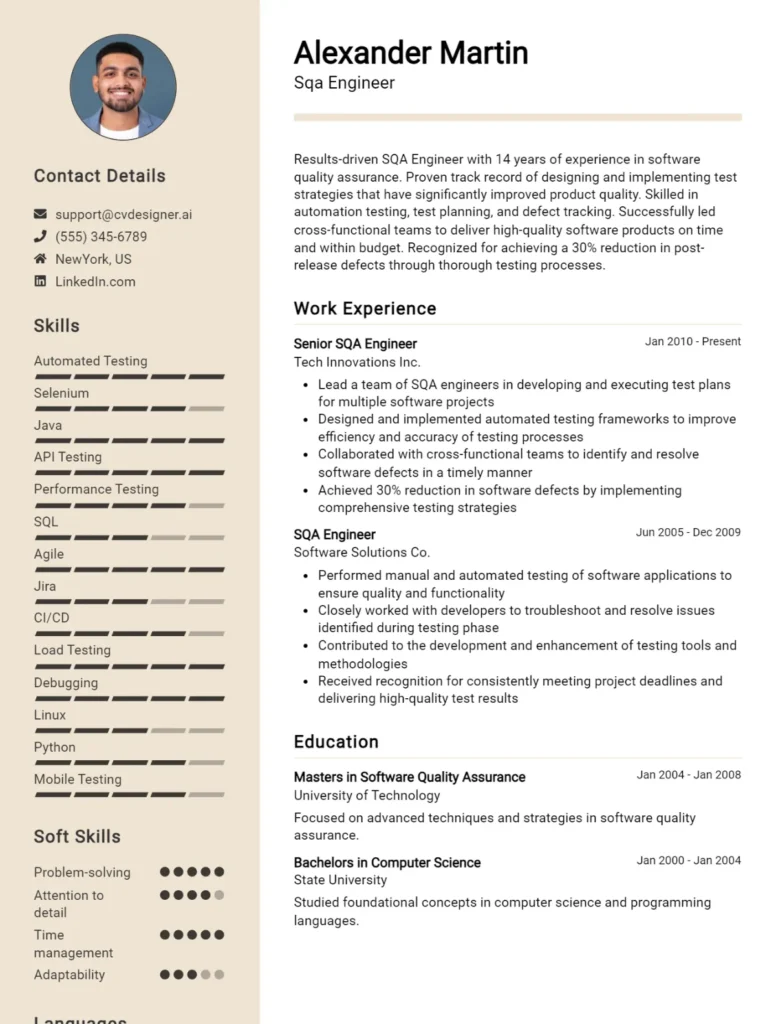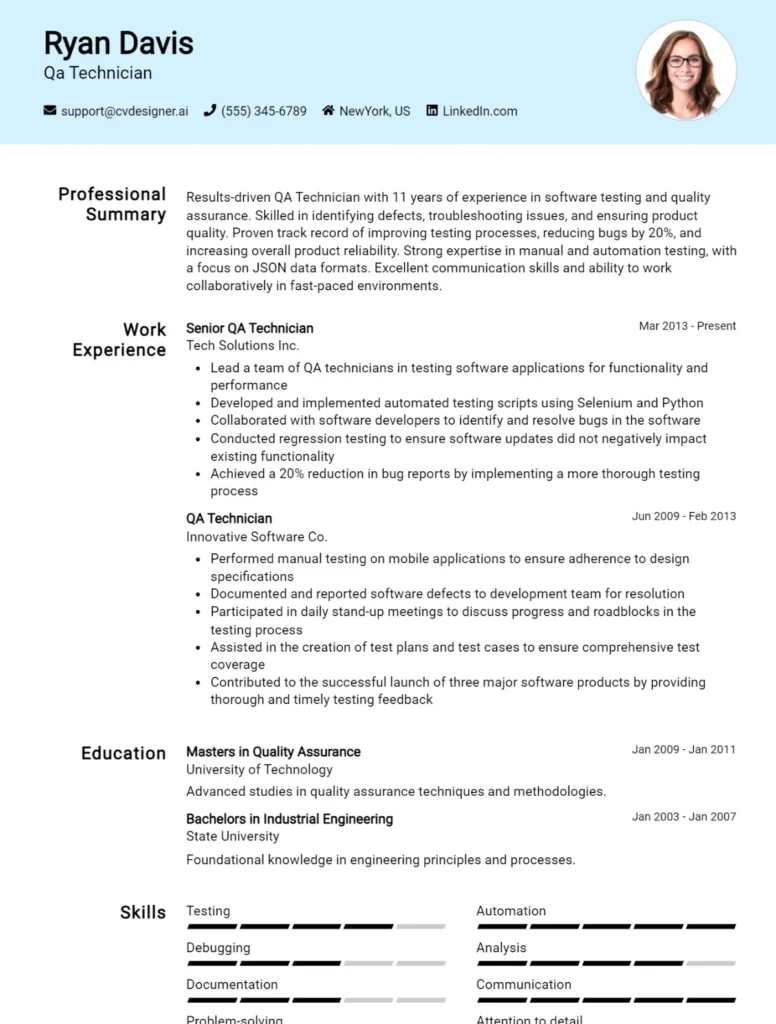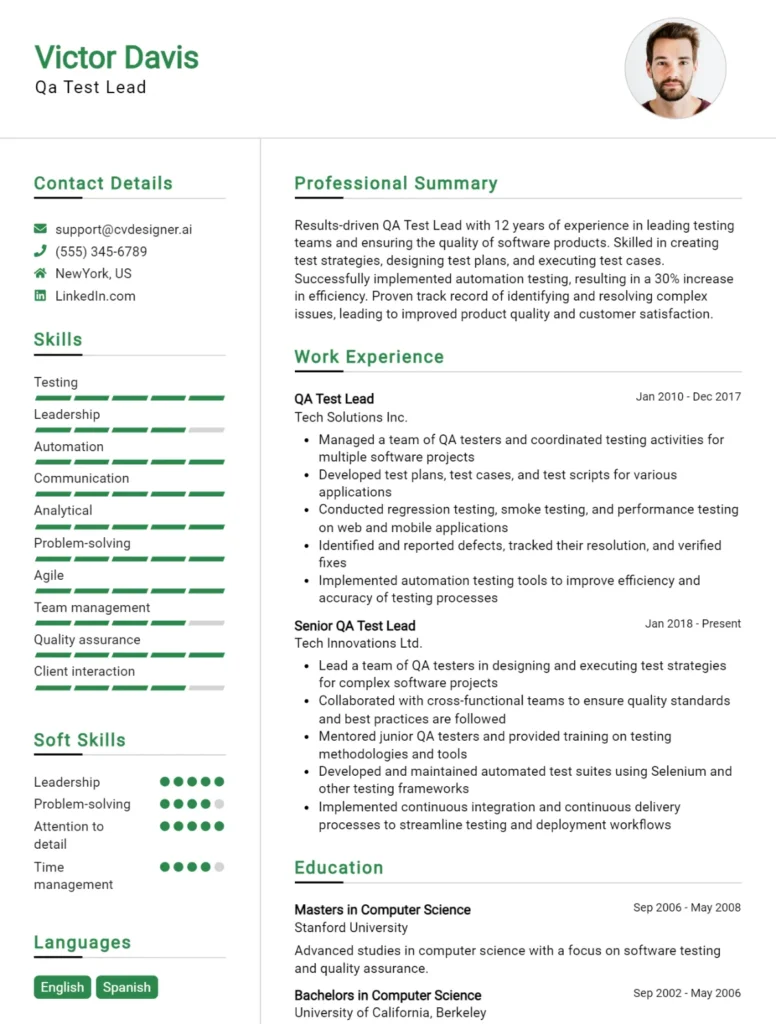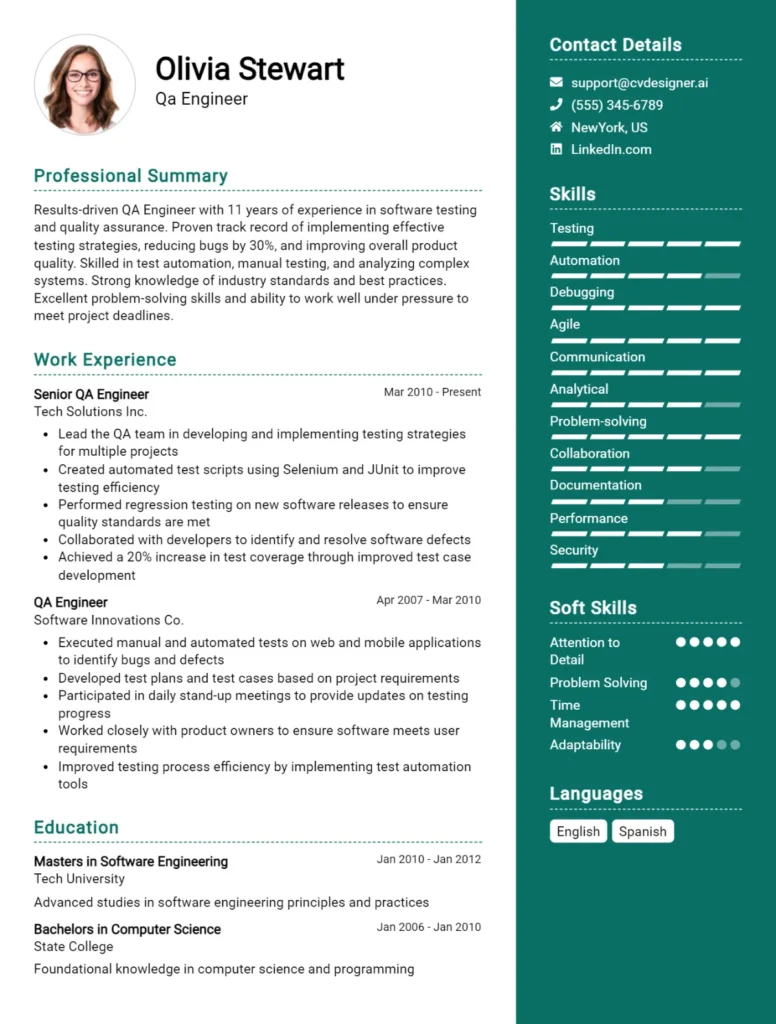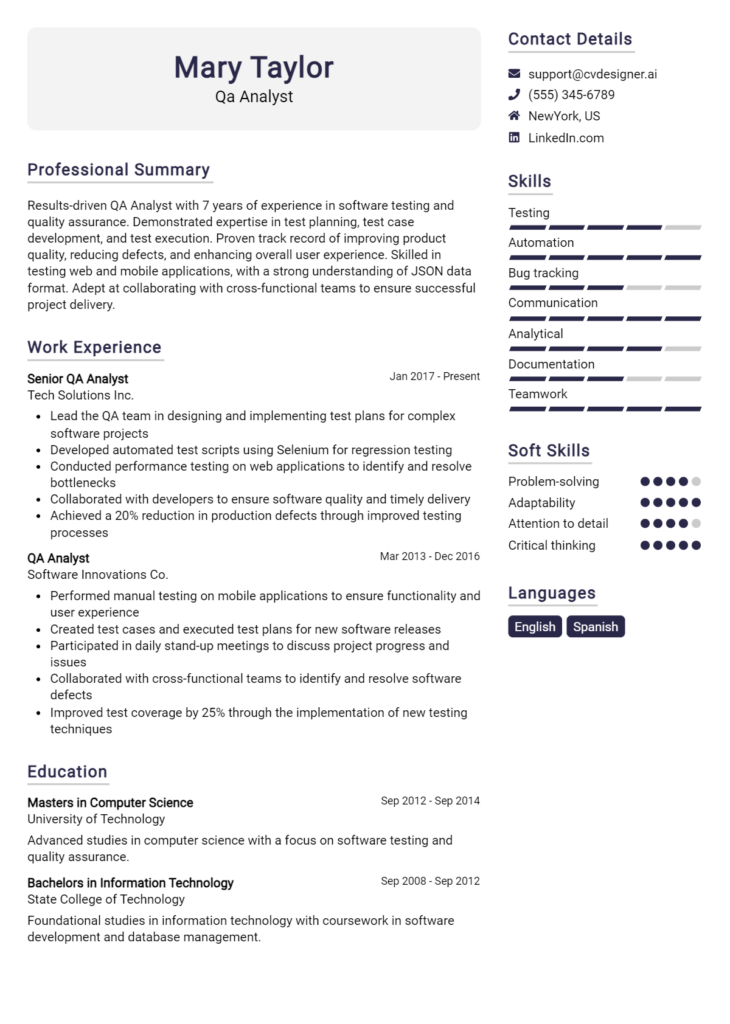Most Popular Qa Tester CV Examples
Explore additional Qa Tester CV samples and guides and see what works for your level of experience or role.
As the digital landscape continues to evolve, the demand for quality assurance (QA) testers is on the rise. Crafting a compelling CV is essential for standing out in this competitive field. In this guide, we will walk you through the nuances of writing a QA tester CV that not only showcases your skills and experience but also captures the attention of hiring managers. You'll learn how to highlight your technical expertise, problem-solving abilities, and attention to detail, which are crucial in ensuring that software products meet the highest quality standards. By the end of this article, you'll have a clear understanding of how to structure your CV effectively and present your qualifications in the best light. Here’s what you can expect to discover:
- Key components of a successful QA tester CV
- Tips for showcasing relevant technical skills and tools
- How to effectively highlight your professional experience
- The importance of including certifications and continuous learning
- Strategies for tailoring your CV for specific job applications
- A detailed CV example to guide your writing process
Get ready to elevate your job application game and land that QA testing role you’ve been eyeing!
What is a QA Tester CV?
A QA Tester CV serves as a crucial tool for professionals in the quality assurance field, showcasing their skills, experience, and suitability for potential roles. It is a document that outlines a tester's proficiency in various testing methodologies, familiarity with automation tools, and their ability to identify and resolve software issues effectively. A well-crafted CV allows a QA Tester to present their technical abilities, attention to detail, and problem-solving skills, which are essential in ensuring the quality and reliability of software products. For guidance on how to create an impactful CV, refer to this cv writing guide.
The importance of a QA Tester CV extends beyond merely listing qualifications; it is an opportunity to highlight past achievements and specific contributions to projects. A clear and concise CV can make a significant difference in standing out to potential employers in a competitive job market. Utilizing tools like a cv maker can streamline the process, enabling testers to focus on showcasing their expertise effectively. Ultimately, a strong CV can open doors to new opportunities and elevate a QA Tester’s career.
Key Components of a QA Tester CV
- Contact Information: Include your full name, phone number, email address, and LinkedIn profile or personal website link for easy access by potential employers.
- Professional Summary: A brief overview of your experience, skills, and what you bring to the role as a QA Tester. This should highlight your strengths and career objectives.
- Skills: Detail your technical and soft skills relevant to QA testing. This can include knowledge of testing tools, programming languages, and methodologies. For a comprehensive look at essential skills, you can refer to this skills link.
- Work Experience: List your previous positions in reverse chronological order. Focus on roles related to QA testing and detail your responsibilities and achievements. More guidance on this can be found in the work experience link.
- Education: Include your highest degree, the institution attended, and graduation date. If you have relevant certifications, list them here as well.
- Certifications: Mention any relevant certifications, such as ISTQB, CSTE, or other testing-related qualifications that enhance your credibility as a QA Tester.
- Testing Tools Proficiency: Highlight your proficiency in various testing tools such as Selenium, JIRA, TestRail, or any other tools you have experience with.
- Methodologies: Specify your experience with different testing methodologies like Agile, Waterfall, or DevOps. This shows your adaptability to various work environments.
- Projects: Describe significant projects you’ve worked on that illustrate your testing expertise. Include the project scope, your role, and the outcomes achieved.
- Technical Knowledge: Showcase any programming or scripting languages you are familiar with, such as Java, Python, or SQL, which can be advantageous in automated testing.
- Problem-Solving Skills: Provide examples of challenges you've faced in your QA role and how you resolved them, demonstrating your analytical and critical thinking abilities.
- References: Optionally include references or state that they are available upon request. This adds a professional touch and shows you're prepared to provide endorsements of your work.
Sample QA Tester CV for Inspiration
[Your Name]
[Your Address]
[City, State, Zip]
[Your Phone Number]
[Your Email Address]
[LinkedIn Profile URL]
Professional Summary
Detail-oriented and analytical QA Tester with over 5 years of experience in software testing and quality assurance. Proven track record of identifying defects and ensuring that software products meet high standards of quality and performance. Expertise in manual and automated testing methodologies, bug tracking tools, and developing test plans and cases. Strong problem-solving skills and ability to work collaboratively within a team to deliver high-quality software solutions.
Work Experience
QA Tester
XYZ Technologies, City, State
June 2021 – Present
- Developed and executed test plans, test cases, and test scripts for web and mobile applications, ensuring compliance with functional and non-functional requirements.
- Conducted manual testing and automated testing using Selenium and JUnit, leading to a 30% decrease in defect leakage post-release.
- Collaborated with developers and product managers to identify and resolve issues, resulting in improved software usability and performance.
- Participated in Agile development processes, contributing to sprint planning and daily stand-ups to ensure timely delivery of quality software products.
Junior QA Tester
ABC Solutions, City, State
January 2019 – May 2021
- Assisted in the creation and execution of test cases for various software applications, including ERP and CRM systems.
- Performed regression testing and smoke testing to ensure that new features did not adversely affect existing functionality.
- Documented defects in JIRA, tracked their resolution, and communicated findings to the development team for prompt action.
- Supported user acceptance testing (UAT) by preparing test environments and coordinating testing sessions with end-users.
Education
Bachelor of Science in Computer Science
University of Technology, City, State
Graduated: May 2018
Skills
- Manual and Automated Testing
- Test Planning and Execution
- Defect Tracking and Management (JIRA, Bugzilla)
- Test Automation Tools (Selenium, QTP)
- API Testing (Postman, SoapUI)
- Performance Testing (LoadRunner)
- Agile Methodologies (Scrum, Kanban)
- Strong Analytical and Problem-Solving Skills
- Excellent Communication and Teamwork
Publications
- "The Importance of Automated Testing in Agile Development," Tech Journal, May 2022.
- "Effective Strategies for Manual Testing," Software QA Monthly, January 2023.
Certifications
- Certified Software Tester (CSTE) - 2022
- ISTQB Certified Tester - Foundation Level (CTFL) - 2021
- Agile Tester Certification (Agile Alliance) - 2023
References available upon request.
QA Tester CV Writing Tips
When crafting a CV as a QA Tester, it's crucial to highlight both your technical skills and your attention to detail. Start by tailoring your CV to the specific job you're applying for, emphasizing relevant experience and accomplishments that demonstrate your ability to identify and resolve issues. Use clear and concise language, and make sure your CV is well-organized and free of errors, as this reflects the diligence you would bring to a QA role. Additionally, incorporating specific metrics or examples of your contributions can help showcase your impact in previous positions.
CV Writing Tips for QA Testers:
- Highlight Relevant Skills: Include key QA methodologies, tools, and programming languages (e.g., Selenium, JIRA, SQL) that are relevant to the job description.
- Detail Your Experience: Describe previous roles with a focus on your responsibilities in testing processes, bug tracking, and quality assurance.
- Showcase Certifications: List any relevant certifications (e.g., ISTQB, CSTE) to demonstrate your commitment and expertise in QA.
- Use Action Verbs: Start bullet points with action verbs (e.g., "executed," "developed," "analyzed") to create a dynamic impression of your contributions.
- Include Metrics: Whenever possible, quantify your achievements (e.g., "reduced bug count by 30% through comprehensive testing").
- Focus on Problem-Solving Skills: Highlight experiences where you identified issues and implemented effective solutions.
- Tailor for Each Application: Customize your CV for each job application by aligning your experience and skills with the specific requirements of the position.
- Keep it Professional: Ensure the format is clean and professional, using appropriate fonts and spacing to enhance readability.
QA Tester CV Summary Examples
As a QA Tester, an effective CV summary is crucial for showcasing your skills and experience to potential employers. Here are several examples that highlight different strengths and qualifications within the field of quality assurance testing.
Detail-oriented QA Tester with over 5 years of experience in manual and automated testing. Proven track record of identifying bugs and ensuring software quality in high-pressure environments. Strong analytical skills and a commitment to delivering high-quality products.
Dedicated QA Tester with expertise in developing and executing test plans, test cases, and test scripts. Skilled in both functional and regression testing, with a passion for improving user experiences through meticulous quality assurance processes.
Results-driven QA Tester with a solid background in performance and security testing. Adept at collaborating with cross-functional teams to ensure timely project delivery while maintaining the highest quality standards. Committed to continuous learning and professional development.
Proficient QA Tester with hands-on experience in agile methodologies and test automation tools such as Selenium and JMeter. Excellent problem-solving skills and a keen eye for detail, ensuring that applications are thoroughly tested and user-ready.
Enthusiastic QA Tester with a strong foundation in software development life cycles and quality assurance best practices. Proven ability to communicate effectively with developers and stakeholders to enhance product quality and drive successful project outcomes.
Build a Strong Experience Section for Your QA Tester CV
As a Quality Assurance (QA) Tester, showcasing your work experience effectively is crucial to demonstrate your expertise and value to potential employers. Highlighting your technical skills, problem-solving abilities, and attention to detail will set you apart. Below are several examples of strong work experience descriptions tailored for a QA Tester CV.
- Developed and executed comprehensive test plans and test cases for web and mobile applications, ensuring high-quality deliverables and adherence to functional requirements.
- Identified, documented, and tracked defects using JIRA, collaborating closely with development teams to facilitate timely resolutions and improve overall software quality.
- Conducted automated testing using Selenium and TestNG, significantly reducing regression testing time and enhancing test coverage across multiple platforms.
- Participated in Agile ceremonies, including daily stand-ups and sprint planning, contributing to continuous improvement and fostering clear communication among cross-functional teams.
- Designed and maintained a suite of performance tests using JMeter, resulting in optimized application performance and increased user satisfaction.
- Executed usability testing sessions with end-users to gather feedback on application interfaces, leading to actionable insights and improved user experience design.
- Collaborated with product owners to clarify acceptance criteria and ensure requirements were testable, enhancing the overall development workflow and reducing post-release defects.
- Trained and mentored junior QA testers on best practices in testing methodologies and tools, fostering a culture of quality and continuous learning within the team.
QA Tester CV Education Examples
As a QA Tester, having a solid educational background can significantly enhance your skill set and career prospects. Here are some examples of educational qualifications that are particularly relevant to the role of a QA Tester:
- Bachelor’s Degree in Computer Science: A comprehensive understanding of programming and software development principles, providing a strong foundation for testing methodologies.
- Bachelor’s Degree in Information Technology: Focuses on the application of technology in various fields, equipping QA testers with the necessary skills to understand different software systems.
- Certification in Software Testing (e.g., ISTQB): Specialized training that demonstrates a tester's knowledge of testing principles, techniques, and best practices, often recognized by employers.
- Bachelor’s Degree in Software Engineering: Offers in-depth knowledge of the software development lifecycle, including testing processes, which is crucial for effective quality assurance.
- Associate Degree in Web Development: Provides practical skills in web technologies, allowing QA testers to effectively evaluate web applications and ensure their functionality and usability.
Skills to Highlight in Your QA Tester CV
As a QA Tester, your ability to ensure the quality and reliability of software products is crucial in delivering a seamless user experience. Highlighting a combination of technical expertise and interpersonal skills in your CV can set you apart in the competitive job market. Below are key soft and hard skills that will showcase your qualifications and readiness for a QA Tester role.
Soft Skills:
- Attention to Detail
- Analytical Thinking
- Problem-Solving
- Communication Skills
- Team Collaboration
- Time Management
- Adaptability
- Critical Thinking
- Conflict Resolution
- Empathy
Hard Skills:
- Familiarity with Testing Tools (e.g., Selenium, JIRA)
- Knowledge of Testing Methodologies (e.g., Agile, Waterfall)
- Proficiency in Programming/Scripting Languages (e.g., Java, Python)
- Experience with Automated Testing
- Understanding of Software Development Life Cycle (SDLC)
- API Testing Skills
- Performance Testing Techniques
- Knowledge of Database Management (SQL)
- Familiarity with Version Control Systems (e.g., Git)
- Ability to Write and Execute Test Cases
QA Tester CV Format
When crafting a CV for a QA Tester position, it's essential to tailor the format to reflect your experience and expertise. An effective CV format not only highlights your technical skills but also demonstrates your understanding of quality assurance processes. For entry-level, mid-level, and senior QA Tester roles, different formats can be adopted to best showcase your qualifications.
For entry-level positions, a functional format that emphasizes skills and relevant coursework might be best. Mid-level candidates can opt for a combination format that balances skills with professional experience. For senior roles, a chronological format that showcases a progressive career path and leadership skills is most effective.
- Contact Information: Include your name, phone number, email address, and LinkedIn profile.
- Professional Summary: A brief overview of your experience, emphasizing your skills in testing methodologies and tools.
- Technical Skills: List relevant software, programming languages, and testing frameworks (e.g., Selenium, JIRA, TestRail).
- Work Experience: Detail your previous roles, focusing on key responsibilities and achievements in QA testing.
- Certifications: Highlight any relevant certifications, such as ISTQB or CSTE, to bolster your qualifications.
- Education: Include your degree(s) and any relevant coursework related to quality assurance or software testing.
For more information on different CV formats, visit cv format.
Common Mistakes to Avoid in a QA Tester CV
When applying for a QA Tester position, your CV serves as your first impression to potential employers. A well-crafted resume not only highlights your skills and experience but also demonstrates your attention to detail—a critical quality in quality assurance. However, many candidates make common mistakes that can hinder their chances of landing an interview. To help you create a standout CV, here are some pitfalls to avoid:
- Using a generic template: Customizing your CV for the specific QA role can make a significant difference in capturing the hiring manager's attention.
- Neglecting to highlight relevant skills: Ensure you prominently display key QA skills such as test case design, automation tools, and bug tracking systems.
- Failing to quantify achievements: Use specific metrics to demonstrate your impact, such as the percentage of bugs caught before release or improvements in testing efficiency.
- Overloading with technical jargon: While technical skills are important, avoid excessive jargon that could confuse non-technical reviewers.
- Listing responsibilities instead of achievements: Focus on what you accomplished in previous roles rather than just outlining your duties.
- Including irrelevant work experience: Tailor your work history to emphasize roles and projects related to quality assurance; unrelated jobs can dilute your CV's impact.
- Ignoring formatting and organization: A cluttered or poorly structured CV can detract from your qualifications. Use clear headings and bullet points for easy reading.
- Not including keywords from the job description: Incorporate relevant keywords from the job listing to pass through Applicant Tracking Systems (ATS) and catch the recruiter's eye.
- Omitting soft skills: Quality assurance requires strong communication and teamwork skills, so include these along with your technical abilities.
- Submitting without proofreading: Spelling and grammatical errors can undermine your professionalism and attention to detail, so be sure to proofread thoroughly before submitting.
Key Takeaways for a QA Tester CV
- Start with a strong summary statement that highlights your experience and key skills as a QA Tester.
- Include specific QA methodologies you are proficient in, such as Agile, Waterfall, or V-Model, to demonstrate your versatility.
- Detail your hands-on experience with test design, execution, and reporting, emphasizing both manual and automated testing.
- Highlight your familiarity with various testing tools (e.g., Selenium, JIRA, TestRail) and specify your level of expertise with each.
- Mention your programming skills, particularly if you have experience with scripting languages like Python, Java, or JavaScript for test automation.
- Showcase your achievements with quantifiable results, such as reducing bug counts or improving testing efficiency.
- Tailor your CV for each job application, aligning your skills and experiences with the specific requirements of the position.
- Include any relevant certifications (e.g., ISTQB, CSTE) to bolster your professional credibility.
- Emphasize your collaboration skills, illustrating how you work effectively with developers, product managers, and other stakeholders.
- Use clear and concise language, avoiding jargon that may not be understood by all readers.
- For a polished presentation, consider using professional cv templates to enhance the visual appeal of your resume.
- Utilize a cv builder for an easy and efficient way to create your CV, ensuring all necessary sections are included.
- Don’t forget to pair your CV with a strong cover letter using cover letter templates to make a comprehensive application package.
Build your CV in minutes
Use an AI-powered cv builder and have your cv done in 5 minutes. Just select your template and our software will guide you through the process.
